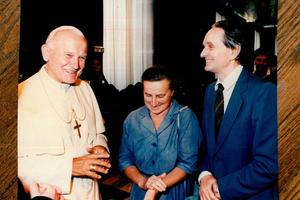The Real Enemy of Joy: Selfishness
COMMENTARY: Have we as a society lost sight of a Teacher whose words and actions mark a path for joy and fulfillment of the human heart that never fails?

For many people, ours is a joyless society for want of good relationships. There is a great deal of physical intimacy today. But there is also a terrible plague of loneliness, regret and unfulfilled hearts, afflicting many of those who are physically intimate with another person, and sometimes with several other people.
Is this a coincidence? Is there a remedy?
I distinguish joy from things that eventually fade like pleasure, distraction or amusement. By “joy,” I mean something that enlivens the heart and enlightens the mind and that brings a deep and lasting sense of fulfillment. While joy bears some relation to the material or external conditions in which we live, it is not reducible to them. People can lack nothing materially and still lack joy. And I grant that in what Christians call a “fallen world” — an imperfect place with imperfect inhabitants — there will always be some measure of pain alongside the joy.
Paradoxically, then, pain is not really the contrary of joy, as the lives of many heroic men and women in this fallen world testify.
That everyone desires joy will not be controversial. Why many do not find it could be. If you believe man has a soul — an organizing spiritual principle, let’s call it, for human activity — then you will give one solution to the problem. If you don’t, then you will give another.
The question of why joy is missing could seem complex. To be fair to individual people, we should not abruptly drop a template on their lives to resolve the matter. Yet Pope Francis describes the effects of a lack of joy as sorrow, inner emptiness and loneliness. Are these symptoms not common, even among those who seem to live busy, “full” lives? In a spirit of compassion, can anything be done to alleviate these troubles?
If she is to be faithful to her founder, the Pope tells us, then the Church — Christians — must undertake an earnest mission to foster and share joy. “I have told you these things so that my joy may be in you and your joy may be complete,” said Jesus Christ (John 15:11). The proclamation of the kingdom of heaven is the sharing of God’s joy by his Son, in some measure in this life and in the fullness of the life to come. From the Christian standpoint, the human soul is made for joy, for the “good news” the Gospel proposes.
The Gospel distinguishes the pain we suffer through no fault of our own, from the pain we inflict morally, and even physically, upon ourselves. The Church offers meaning to the former by holding up the cross of Christ. She offers relief for the latter — let’s call it sin — by God’s mercy, even as she urges us to avoid self-inflicted wounds. In both cases, she carries out her mission to protect and promote the joy of Jesus Christ.
For Christians, Jesus is Lord. But even those who don’t believe Jesus is who he claims to be recognize the quality of his moral teaching and of his moral character. He was generous-hearted, self-effacing and self-forgetful and thoughtful and practical in his help and counsel … in a word (or two): self-giving. He did not just give assistance to individual people, he gave himself to them … in his time and affection … and, finally, he gave himself for them, at Calvary, so that they could have eternal life. And Christians believe that, his passion and cross notwithstanding, Jesus lived an intensely happy, fulfilled, joyful human life. He came to share what was his: “… that my joy may be in you …”
So here is how I might summarize the path to joy, after the example of the God-Man: Joy comes from giving life by giving self. By “giving life,” I do not mean exclusively in the sense of begetting a new human being, though I am certainly including that. To give life can take many forms, if we understand it to mean building up someone in truth and love.
Even if we do not immediately see the connection between joy and self-giving, we do know that we admire people in proportion to the extent that they give themselves, especially at the cost of much personal sacrifice. So can it be that what we admire indicates what we would like to see in ourselves and, so in turn, how we find fulfillment? If these things are true, then the real enemy of joy is not pain — which may accompany self-giving — but selfishness, something we certainly do not admire in ourselves or in others.
This is why the Church describes unchaste behavior of any kind — contraception, masturbation, homosexual activity — as selfish, because something is missing or misdirected with regard to self-giving. Nor can these things give life, in either the general sense or the more obvious one.
For these reasons, the intensity of personal feelings or sensations aside, these actions are ultimately unfulfilling, even when they occur between two people who love each other.
Experience tells us that what we feel at a given moment may not prove to be good for us and indeed may harm us. Have we lost sight of a Teacher whose words and actions mark a path for joy and fulfillment of the human heart that never fails?
Father Paul Check is the executive director of Courage International.
















